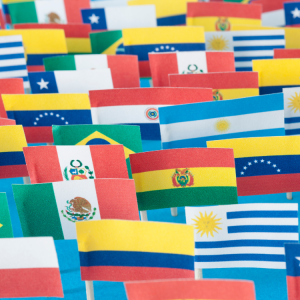CLS: Latin America Labor/Migration Conditions
Stay current and learn about the labor and economic conditions in Central America/Mexico and some of the forces that drive migration northward.
Eugenio Mollo Jr.
Monday, Aug. 5, 10:30 a.m. | Orchestra Hall
“Current Topics in Immigration Law & Southern U.S. Border Policy”
 This lecture with Eugenio Mollo Jr. provides an overview of current topics in immigration law and border policy, with an emphasis on Latin American migration to the U.S.
This lecture with Eugenio Mollo Jr. provides an overview of current topics in immigration law and border policy, with an emphasis on Latin American migration to the U.S.
Learn about a series of recent measures the federal government has initiated to improve border security, reduce “irregular” migration and promote safe and orderly pathways for people to come to the U.S. One new pathway includes using the government’s parole authority to facilitate the entry of thousands of nationals from Cuba, Haiti, Nicaragua and Venezuela.
The presentation also covers programs like DACA (Deferred Action for Childhood Arrivals) and TPS (Temporary Protected Status), which provide temporary immigration benefits to many immigrants, including those from Latin American countries. Mollo aspires that this lecture will be valuable for participants who wish to engage in an informed conversation on immigration law and border policy topics.
Mollo is a Clinical Assistant Professor of Law and the inaugural Director of the Immigrant Justice Clinic at the University of Toledo College of Law. He joined the College of Law in 2016 as an adjunct professor to teach immigration law courses and was added to the full-time faculty in 2022.
In 2006, Mollo began his legal career as an Equal Justice Works Fellow at Advocates for Basic Legal Equality (ABLE) in Toledo, a nonprofit law firm that represents low-income individuals and groups to achieve equal justice and opportunity.
From 2013-2022, he served as the managing attorney of the Agricultural Worker and Immigrant Rights Practice Group. Mollo led and oversaw projects that provided legal assistance to migrant farmworkers, people in removal proceedings, unaccompanied children, refugee survivors of torture, and other vulnerable immigrant populations.
He earned his bachelor’s degree from the University of Illinois and his J.D. from the University of Iowa College of Law.
Giada Ferrucci
Tuesday, Aug. 6, 10:30 a.m. | Orchestra Hall
“Engage Solidarity: Tracing the Impacts of U.S. Citizen Activism in Central America”
Since the mid-1970s, Central American residents in the U.S. actively urged fellow Americans to oppose detrimental U.S. policies affecting the region.
By organizing delegations to countries like Guatemala and El Salvador, they effectively observed and reported on the direct impacts of military and paramilitary operations. Delegates wrote letters to representatives, contributed to local newspapers, dispelled misinformation and spoke out to raise awareness of human rights violations.
Unlike impartial humanitarian interventions, these solidarity efforts are fascinating because they illustrate how Americans perceived themselves as collaborating with local empowerment movements. Moreover, this approach aligns with progressive humanitarian traditions by responding directly to local calls for aid, rather than relying on external assessments of “needs.”
In this presentation, Giada Ferrucci will delve into how historical models of solidarity among U.S. citizens persist, remain relevant and continue to evolve in the defense of human rights both within and beyond their borders.
Wednesday, Aug. 7, 10:30 a.m. | Orchestra Hall
“Flowing Together: Uniting El Salvador & Michigan in the Fight for Water Justice”
Citizens of El Salvador and Michigan are facing strikingly similar challenges related to water justice due to factors, such as industrial pollution, inadequate infrastructure and corporate interests.
Drawing parallels between these two seemingly disparate locations sheds light on universal issues surrounding water rights and provides a compelling framework for a united fight to defend water.
In El Salvador, local efforts emerged in response to transnational mining corporations exploiting water resources, leading to pollution and scarcity. Similarly, in Michigan, communities mobilized against issues like the Flint water crisis, highlighting the detrimental impact of industrial practices on water quality.
In this talk, Ferrucci will delve into the interconnected struggles for water justice in El Salvador and Michigan. By drawing parallels and framing the issues within a broader context, we can inspire a collaborative movement to defend water and advocate for policies that prioritize community well-being, environmental sustainability and corporate accountability.
Ferrucci is a Ph.D. candidate in media studies at Western University in London, Ontario. She holds a bachelor’s degree in economic development and international cooperation from the University of Florence, Italy, where her research focused on the opium trade in Afghanistan and alternative economic development reforms, and a master’s degree in international relations from Aarhus University in Denmark, where she focused on the human right to water.
Ferrucci’s current research focuses on environmental communication, social movements and activism, and environmental justice. She is a member of the Center for Environment and Sustainability at Western University.
Brad Jokisch
Friday, Aug. 9, 10:30 a.m. | Orchestra Hall
“The Rise of Family Migration from Latin America to the United States: A Case Study of Ecuador”
Since 2019, a significant number of emigrants from numerous countries in Latin America and the Caribbean have arrived at the U.S. border or entered in family units (parent or guardian with a child). This development is a distinct change from previous migration patterns and is one of many of the new patterns of migration in and from the region.
This presentation with Brad Jokisch examines the case of Ecuador, which is a significant source of migration to the U.S. but has also become an important destination and country of transit for Latin American migrants.
Nearly 500,000 Ecuadorans live in the U.S., mostly in metro New York, and nearly that number of Venezuelans fled to Ecuador in the past eight years. The current situation will be set in the historical context of Ecuadoran emigration.
Brad Jokisch is an Associate Professor at Ohio University, and his research interests lie at the nexus of population, environment and development, mostly in Latin America. He is most interested in how migration and other population changes affect the environment, and in turn how development affects population change.
His research in the Ecuadoran Andes has focused on land-use/cover change and the impact of transnational migration on landscapes and livelihoods.
During 2023-24 he will be on a Fulbright Scholarship to Ecuador, researching the development of family emigration from the highlands of southern Ecuador. Brad earned his bachelor’s degree from Augustana College in 1989 and Ph.D. from Clark University in 1998.

This event is included with your Daily, Weekly or Season Chautauqua Pass.
Date
- Aug 05 - 09, 2024
- Expired!
